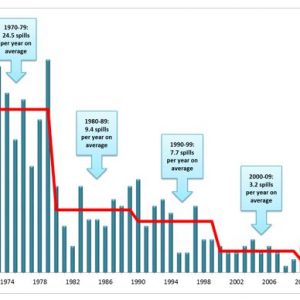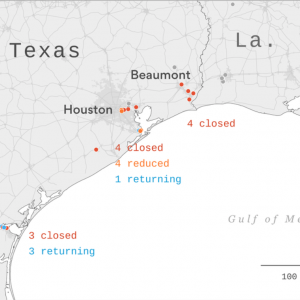Lipstick on a Pig?
It appears to be no coincidence that ExxonMobil has recently released a new series of beautiful and very slick TV and online ads implying that they are all about innovation and very interested in alternative energies. (Their most recent releases are below:)
Reality is far from the images portrayed in this campaign where internal combustion engines emit rainbows and industry scientists spend time researching algal-based biofuels. Indeed, this current lobbying effort seem to be mostly about serving as something of a counter point to two major media stories capturing wider media attention here in December of 2015: the Paris Climate Change Summit and the unfolding investigation into alleged illegal statements and deception from Exxon leadership. While the role of ExxonMobil in funding anti-science campaigns and backing political candidates who loathe facts or reasoned discussion on energy policy and the most detrimental aspects of our oil-based economy is well known.
What we say to our family vs. what we tell the neighbors
Recent investigations into Exxon’s internal documents show they were indeed at the cutting of climate change research back in the day and knew of the potential threats of fossil fuel-related emissions since I was a little kid in the 1970’s. As Harvard climate historian Naomi Orestes noted in the New York Times in October:
But Exxon was sending a different message, even though its own evidence contradicted its public claim that the science was highly uncertain and no one really knew whether the climate was changing or, if it was changing, what was causing it … Journalists and scientists have identified more than 30 different organizations funded by the company that have worked to undermine the scientific message and prevent policy action to control greenhouse gas emissions.
Exxon responded to these revelations by pointing out that over the last 4o years their scientists (apparently the lady in the above TV spot???) have continued to publish peer-reviewed climate research:
Our scientists have contributed climate research and related policy analysis to more than 50 papers in peer-reviewed publications – all out in the open. They’ve participated in the United Nations Intergovernmental Panel on Climate Change since its inception – in 1988 – and were involved in the National Academy of Sciences review of the third U.S. National Climate Assessment Report.
Finally, I’ll note that we have long – and publicly – supported a revenue-neutral carbon tax as the most effective, transparent, and efficient way for governments to send a signal to consumers and the economy to reduce the use of carbon-based fuels.
The interesting issue here is the apparently marked divergence between the now-released revelations from these previously hidden internal reports and Exxon’s public face (their spokesman pointed to Exxon’s peer-reviewed publications from their scientists between 1983 and 2014 – 53 papers in all), including their comments to shareholders.
While the then-Exxon (now ExxonMobil) was understanding and apparently attempting to deal with climate change as early as 1977 (note to my younger students: this was when the first Star Wars was released and 11 years before the launch of the IPCC), their outward arguments have been something different. Distinct from this internal behavior/reality, Exxon has had a different public persona since at least the mid 1980’s. To the wider world, Exxon has spent the past 40 years wholeheartedly refusing to publicly acknowledge climate change and gone so far as to promote misinformation (a more cynical person might even use the term “propaganda”) ala the tobacco industry regarding the health risks of smoking. Both were industries producing products and byproducts with significant and increasingly well understood toxicity who were concerned that acknowledging this toxicity could subsequently drive away consumers and ultimately harm their profitability.
Criminal behavior?
The recent revelations of internal documents apparently show that ExxonMobil recognized the potential dangers of climate change and began factoring likely predictions from rising seas, more intense hurricanes, etc. into their own internal business planning and decisions as early as 1981. The ensuing raft of news coverage drove the New York State Attorney General to launch an investigation last month to determine whether ExxonMobil indeed broke the law by misleading investors and the public about the risks posed by climate change.
As The New York Times reported last month:
According to people with knowledge of the investigation, Attorney General Eric T. Schneiderman issued a subpoena Wednesday evening to ExxonMobil, demanding extensive financial records, emails and other documents.
The investigation focuses on whether statements the company made to investors about climate risks as recently as this year were consistent with the company’s own long-running scientific research.
The people said the inquiry would include a period of at least a decade during which Exxon Mobil funded outside groups that sought to undermine climate science, even as its in-house scientists were outlining the potential consequences — and uncertainties — to company executives.
Kenneth P. Cohen, vice president for public affairs at ExxonMobil, said on Thursday that the company had received the subpoena and was still deciding how to respond.
A detailed July 2015 press release from the Union of Concerned Scientists links to various original documents that sparked the recent concern and investigations. Anyone wishing to see the original documents should check that out.
Public double think speak
It is perhaps not surprising that a company that exists to make money might set a course that is designed to maximize their revenues, ecotoxicological facts and planet be damned. Leaving those issues aside, I think it is perhaps most illuminating to see what was actually said over the years. Forget all the rhetoric on both sides of the issue for a moment and focus on what was actually said. The New York Times did a great job in excerpting relevant passages from these internal documents (see the publicly available ones here) in a story last month. I have excerpted and formatted the following statements after that piece. I have added in my own commentary by denoting statements which I believe to be accurate (in green) and statements which are perhaps disingenuous (in red). You can be the judge as to whether these red statements cross the line…or just wait for the New York Attorney General’s formal findings to be released in the coming months.
-
1980Internal Exxon Document
From a paper titled, “Exxon Research and Engineering Company’s Technological Forecast CO2 Effect,” by H. Shaw and P.P. McCall:
“Projections of scientists active in the area indicate that the contribution of deforestation, which may have been substantial in the past, will diminish in comparison to the expected rate of fossil fuel combustion in the future. A number of scientists have postulated that a doubling of the amount of carbon dioxide in the atmosphere could occur as early as 2035. Calculations recently completed at Exxon Research indicate that using the energy projections from the CONAES (Committee on Nuclear and Alternative Energy Systems) study and the World Energy Conference, a doubling of atmospheric CO2 can occur at about 2060.
-
1989Duane G. Levine, Exxon’s Manager of Science and Strategy Development
A year after the NASA climate scientist James Hansen warned Congress that global warming was already occurring, an Exxon scientist made a presentation on the topic to the company’s board of directors. His notes included the following language:
“In spite of the rush by some participants in the greenhouse debate to declare that the science has demonstrated the existence of [global warming] today, I do not believe such is the case. Enhanced greenhouse is still deeply imbedded in scientific uncertainty, and we will require substantial additional investigation to determine the degree to which its effects might be experienced in the future.”
-
1995Lenny Bernstein, Exxon Mobil Chemical Engineer and Expert on Climate Change
An email by Mr. Bernstein to Ohio University’s Institute for Applied and Professional Ethics shows that Exxon (before its merger with Mobil) was aware of climate change science years before it became a political issue.
In his note, Mr. Bernstein refers to a giant natural gas field in Indonesia that Exxon did not ultimately develop:
“Exxon first got interested in climate change in 1981 because it was seeking to develop the Natuna gas field off Indonesia. ”
“When I first learned about the project in 1989, the projections were that if Natuna were developed and its CO2 vented to the atmosphere, it would be the largest point source of CO2 in the world and account for 1 percent of projected global CO2 emissions.”
-
1997Lee Raymond, Exxon Chief Executive
Mr. Raymond, in a speech to the 15th World Petroleum Congress in Beijing, addressed the issue:
“It is highly unlikely that the temperature in the middle of the next century will be affected whether policies are enacted now or 20 years from now.”
-
2000Exxon Mobil Newspaper Ad
In response to the Clinton Administration’s report on the potential effects of climate change on different regions and industries in the United States, the company took out a lengthy ad. Excerpts include:
“The report’s language and logic appear designed to emphasize selective results to convince people that climate change will adversely impact their lives.”
“The report is written as a political document, not an objective summary of the underlying science. Climate change is an important public issue. That is why we support emphasis on further climate research, the development and encouragement of promising technology, the promotion of more efficient use of energy, the removal of barriers to innovation, and cost-benefit assessments of proposed policies.”
-
2002Bob B. Peterson, Chief Executive of Imperial Oil, Exxon Mobil’s Subsidiary in Canada
Mr. Peterson told the Canadian Press news service that “Kyoto is an economic entity,” referring to the Kyoto Protocol initiative to reduce greenhouse gas emissions:
“It has nothing to do with the environment. It has to do with world trade. This is a wealth-transfer scheme between developed and developing nations.”
-
2004Exxon Mobil Newspaper Ad
“Scientific uncertainties continue to limit our ability to make objective, quantitative determinations regarding the human role in recent climate change or the degree and consequences of future change.”
-
2007Rex Tillerson, Exxon Mobil’s Chief Executive
Mr. Tillerson changed course in a speech before a conference in Houston organized by the energy consulting firm Cambridge Energy Research Associates:
“The risks to society and ecosystems from climate change could prove to be significant. So, despite the uncertainties, it is prudent to develop and implement sensible strategies that address these risks.”
“A range implies a certain degree of uncertainty. Policy decisions need to accommodate that uncertainty.”
-
2008J. Stephen Simon, an Exxon Mobil Senior Vice President
Testifying before a Senate Judiciary Committee on May 21, 2008, Mr. Simon was pressed by Senator Sheldon Whitehouse, Democrat of Rhode Island, who suggested that fringe views on climate change were being endorsed and espoused by oil companies. Mr. Simon responded:
“In other words, that we are supporting junk science and trying to make people think that this is not an issue. I think all of us recognize it is an issue. It is how we deal with it – and I think we are dealing with it, and we are doing so in a responsible fashion.”
-
2010Exxon Mobil Annual Report
“Because we want to ensure that today’s progress does not come at the expense of future generations we need to manage the risks to our environment. This includes taking meaningful steps to curb global greenhouse gases (GHG) emissions, while also utilizing local resources to help maintain secure supplies. Energy-related carbon dioxide (CO2) emissions represent close to 60 percent of global GHG emissions attributed to human activities, and are expected to increase about 25 percent from 2005 to 2030. This increase is substantially lower than the projected growth in energy demand over the period, reflecting improved energy efficiency, as well as a shift to a significantly less carbon-intensive energy mix – mainly natural gas, nuclear and wind gaining share as fuels for power generation.”
-
2014Exxon Mobil Annual Report
The company commented on various countries’ consideration of rules for reductions in greenhouse gas emissions to control climate change:
“These requirements could make our products more expensive, lengthen project implementation times, and reduce demand for hydrocarbons, as well as shift hydrocarbon demand toward relatively lower-carbon sources such as natural gas.”
-
2015Ken Cohen, Exxon Mobil Vice President for Public and Government Affairs
Mr. Cohen, in a blog post entitled “Exxon Mobil’s commitment to climate science,” wrote:
“What we have understood from the outset – and something which over-the-top activists fail to acknowledge — is that climate change is an enormously complicated subject.
“The climate and mankind’s connection to it are among the most complex topics scientists have ever studied, with a seemingly endless number of variables to consider over an incredibly long timespan.”







Leave a Reply